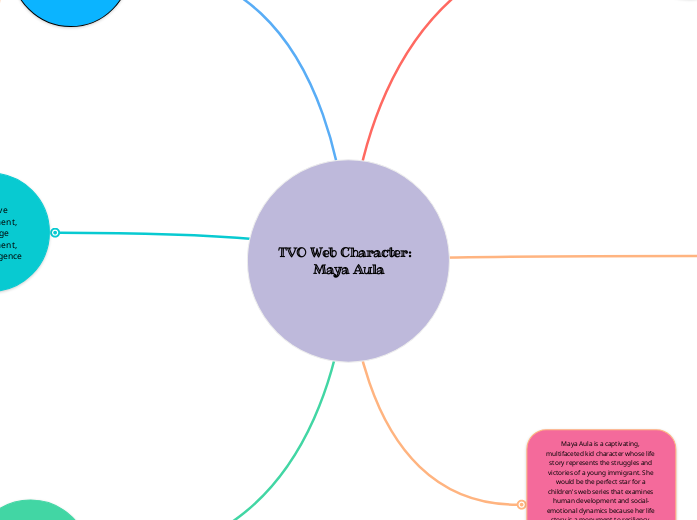TVO Web Character: Maya Aula
Overview
Maya Aula, an 8-year-old child, comes from India and presently lives in a suburban area of California, USA. She has short black hair, beautiful brown eyes, and average height for her age. Maya's bright attitude is reflected in the colorful T-shirts and trousers she usually wears. She is a fluent Hindi and English speaker. Maya has a strong feeling of familial ties, a sharp sense of curiosity, and a profound regard for justice, the natural world, and animals. She is a vivacious and lovable character because of her adventurous attitude, which encourages her to explore and interact with the world around her.
Human Development Concepts and Maya's Personality
Threats to Healthy Development and Coping Mechanisms:
Threats: The difficulties of adjusting to a new school and forming friendships. When first starting school, Maya felt scared because of her identity and that she would not fit in with other people because of her background and heritage. With that, she started off shy.
Infrequent incidents of cultural misinterpretation.
Coping Mechanisms: Open communication and strong family support.
Involvement in athletic teams and groups at school.
Forming bonds with people who have similar interests.
Character Traits, Fears, and Protective Factors:
Characteristics: Kind, adventurous, inventive, and tenacious.
Fears: The fear of being misinterpreted or left out. When left out by other people, she tends to close herself off more and not have the energy to interact with others.
Factors: Loving and supportive family.
Support from peers and teachers.
Participation in extracurricular and community activities.
Influence of Country of Origin on Identity:
India: Maya's values and sense of self are influenced by her rich cultural background.
Impact on Identity: Creating a bicultural identity by fusing American culture with Indian customs.
Mental Health and Personality Formation:
The overall state of mental health is good, and any indications of stress or anxiety are promptly addressed.
A balanced, self-assured personality with a strong sense of self is developed as a result of this influence on personality.
Resilience Expression:
Getting used to a new school environment is one way to express resilience.
Enjoying new experiences and forming new friendships.
Overcoming the early obstacles in integrating cultures.
Maya Aula is a captivating, multifaceted kid character whose life story represents the struggles and victories of a young immigrant. She would be the perfect star for a children's web series that examines human development and social-emotional dynamics because her life story is a monument to resiliency, cultural integration, and personal development. With Maya, the show can tackle issues of identity, belonging, and adventure that are universal and connect with a wide range of viewers.
Physical Development
Prenatal Brain Development Factors:
Pregnancy-related nutritional needs and health of mothers.
Favorable setting for prenatal care.
Sensory and Motor Development (0-6 years):
Early encounters with a range of sensory inputs.
Encouragement of outdoor play and physical activity.
Major Developmental Milestones (Post Age 6):
Enhanced coordination as a result of doing sports and engaging in outdoor activities.
Improved sensory awareness via experimentation and practical exercises.
Impacting Factors:
Positive: Balanced diet, regular physical activities.
Negative: Minor childhood illnesses, promptly treated.
Cognitive Development, Language Development, and Intelligence
Cognitive Development Enhancements:
The availability of excellent education.
promotion of inquiry and wonder.
Individual Differences:
High level of spatial and linguistic intelligence.
Flexibility in educational settings.
Language-Acquisition Processes:
Early language development is fostered in bilingual households.
Formal education in Hindi at home and in English.
Language Development Challenges:
Early difficulties with cultural allusions and English idioms.
Support from encouraging peers and ESL programs.
Multilingual Proficiency:
Fluent in English and Hindi.
Integration of cultures through linguistic proficiency.
Intelligence Styles:
Strong in interpersonal, logical-mathematical, and language intelligences.
Cognitive Development Theories:
The Social Development Theory of Vygotsky: Stresses social interactions as a means of learning.
Piaget's Stages of Cognitive Development: Monitors Maya's cognitive progress.
Social-Emotional Development and Personality
Secure Attachment in Early Years:
A loving home setting that promotes stable connection.
Positive effect on confidence and social skills.
Emotional Expression Changes:
Gaining more control over one's emotions.
Heightened awareness and empathy for other people.
Impact of Marginalization and Bullying:
First social obstacles resulting from experiences of being different and Maya feeling like she was the odd one out in her classes because of who she is and makes her nervous at times.
Development of advocacy abilities and resilience.
Moral Faculty:
Strong ethical grounding derived from familial and cultural beliefs.
Feeling of equity and justice in social relationships.
Media-Driven Social Values:
Selective media consumption that upholds moral principles.
Social media's impact on identity and self-perception.
Birth Order and Temperament:
Parents provide their whole attention and support to their only child gives her strength at times in class to speak more.
Extroverted and introverted qualities together in a balanced temperament.
Family and Community Influence:
A loving family that offers both practical and emotional support.
Engaging the community actively strengthens cultural identity.
Social Interactions:
A varied social network that promotes flexibility and openness.
Social interactions forming a well-rounded individual.
Social-Emotional Development Theory:
Erikson’s Psychosocial Development Theory: Stages of identity formation and role fulfillment.
